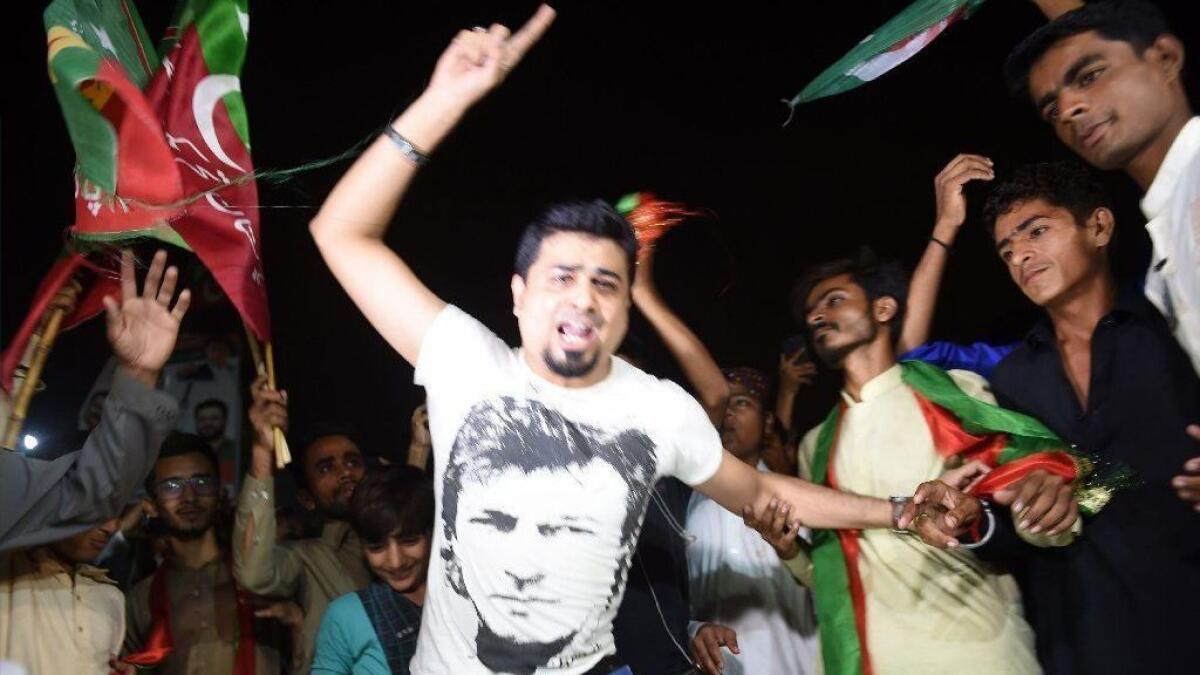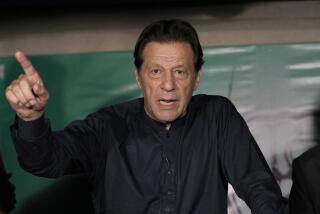Cricket legend Imran Khan claims election victory in Pakistan as opponents cry foul

Imran Khan, a cricket legend turned anti-corruption agitator, claimed a resounding victory Thursday and was poised to become Pakistan’s next prime minister after an election that was tarnished by allegations that the army had rigged the campaign in his favor.
With 228 of 270 National Assembly races decided, Khan’s party had won 108 seats, nearly twice as many as his closest rival, according to unofficial results published by the newspaper Dawn. Final results were delayed until Friday because of technical problems, Pakistan’s election commission said. But the only drama left was whether Khan would gain an outright majority or need to form a coalition government.
Khan, 65, became the latest celebrity to parlay star power into political power by railing against corrupt elites and championing populist ideas tinged with religious conservatism. His rise opens new questions for two of Pakistan’s most troubled relationships: with nuclear-armed rival India, where the media dub him “Taliban Khan” for his coziness with Islamist groups, and with the United States, which he has blasted as an occupying force in neighboring Afghanistan.
Khan is likely to defer authority over those areas to Pakistan’s powerful military establishment — perhaps the biggest winner in Wednesday’s vote. The last elected prime minister, Nawaz Sharif, who attempted to assert his own foreign policy, was dismissed on corruption charges in an ouster apparently orchestrated by the army, which appears to have also coerced some of his allies to support Khan in the election.
“Khan’s victory means that the military is now 100% in the driver’s seat on policy issues with regard to the U.S., with regard to Afghanistan, India, militancy, security issues,” said Shamila N. Chaudhary, former Pakistan director on the National Security Council during the Obama administration.
“It essentially gives the military all the space it has ever wanted to pursue its national security policies the way it wants to,” she said.
In the short term, that could mean more tension with the United States. President Trump in January suspended hundreds of millions of dollars in security assistance after accusing Pakistan of failing to curb militants, including the Taliban, whose battlefield gains have drawn the U.S. military back into a fighting role in Afghanistan.
But since then, U.S. officials say they have seen little change in Pakistan’s pursuit of anti-American extremists.
Allies of the militant leader Hafiz Saeed, who is wanted by the U.S. for his alleged role in 2008 terrorist attacks in Mumbai, India, were allowed to run as candidates in the election. And last month an international monitoring group placed Pakistan on a watch list for taking inadequate steps to combat terrorism financing.
Pakistan has long denied allegations that it supports Taliban leaders based on its soil. As the U.S. explores direct negotiations with the Taliban for the first time in an effort to end the 17-year Afghanistan war, it is likely to renew pressure on Pakistan to help bring militant leaders to the table.
“The problem is that no civilian leader has been able to scale back the problem of the military’s dominance in foreign policy and national security — and I don’t think Imran Khan is going to raise any questions,” said Alyssa Ayres, a South Asia expert at the Council on Foreign Relations.
“There are just no signs that an Imran Khan-led government is one that will want to take on a positive leadership role in the relationship with the U.S.,” she said.
In a televised victory speech, Khan spoke in conciliatory terms about the United States and India. He also praised Western countries as he pledged to improve accountability for corruption, saying that “if the West has been successful, it’s because the law is the same for everybody.”
The product of an elite prep school in Lahore, Khan studied at Oxford University before joining the national cricket team and, with his rugged good looks, later became a fixture on the London nightclub circuit. After his playing days Khan found religion — in February he wed his former spiritual advisor, his third marriage — and formed his Pakistan Tehreek-e-Insaf, or Movement for Justice, party in 1996.
“After 22 years of struggle, my prayers have been answered,” Khan said. “I have gotten the chance to fulfill my dream and serve the nation.”
In a country reeling from a fiscal crisis and weakening currency, Khan echoed the populist messages he sounded on the campaign trail. He pledged to alleviate poverty, reduce government expenses and use the prime minister’s house as an educational institution — saying he would be “embarrassed” to live in the palatial residence.
His campaign appealed to a broad spectrum of Pakistanis fed up with corruption, and he touted police and education reforms in the northern province of Khyber Pakhtunkhwa, led by his party.
Khan pledged Thursday to build a “new” Pakistan with values like those of Medina, a holy city in Saudi Arabia that thrived in the 7th century and established a welfare state in accordance with Islamic laws.
“Today our state is in shambles,” he said. “All our policies aim to help the less fortunate prosper.”
But he dismayed some of his followers when he chose to field candidates who were formerly allied with Sharif’s party in order to win seats in populous Punjab province — prompting criticism that he was cozying up to the corrupt elites he opposed.
He also faces a looming challenge over Pakistan’s lack of foreign currency reserves, which could require the country to seek a bailout from the International Monetary Fund. Khan had dismissed such a move in the past but has recently indicated he was open to foreign assistance.
“He’s been very domestically focused, but now, given Pakistan’s economic crisis, foreign relations are crucial,” said Moeed Yusuf, associate vice president of the Asia Center at the United States Institute of Peace. “He’s an unknown quantity for the most part internationally.”
Allegations of fraud and manipulation marred a milestone election — the second consecutive nonviolent transfer of power between elected governments in a country that has been under military rule for much of its 71-year history.
The incumbent party formerly led by Sharif — who served as prime minister three times and is now jailed on corruption charges — was in second place. It said that unexplained delays in releasing electronic vote totals amounted to a “humiliation of the public mandate.”
Sharif’s younger brother Shahbaz, leading the party in his absence, suggested he would challenge the results, hinting at a bitter legal battle but one he was unlikely to win, given that the army and judiciary have typically worked hand in glove.
Last year, after documents leaked from a Panamanian law firm suggested Sharif’s family had stashed undeclared wealth overseas, the judiciary targeted him with corruption charges that forced him from office and brought a 10-year prison sentence. He is appealing his conviction.
Khan rejected allegations of favoritism and said the election was “the fairest in Pakistan’s history.”
Special correspondent Sahi reported from Islamabad and Times staff writer Bengali from Mumbai, India.
Shashank Bengali is The Times’ South Asia correspondent. Follow him on Twitter at @SBengali
UPDATES:
5:05 p.m.: This article has been updated with results and analysis.
It was originally published at 6:45 a.m.
More to Read
Sign up for Essential California
The most important California stories and recommendations in your inbox every morning.
You may occasionally receive promotional content from the Los Angeles Times.











